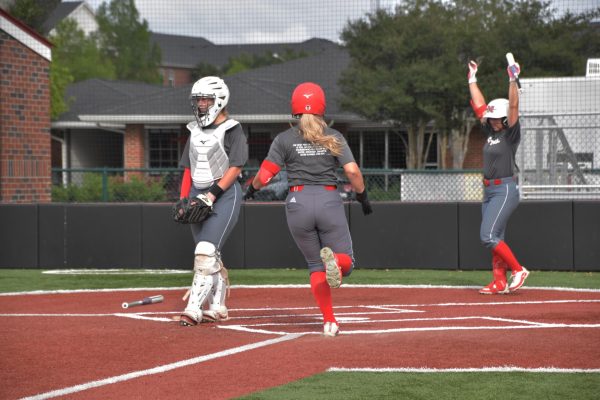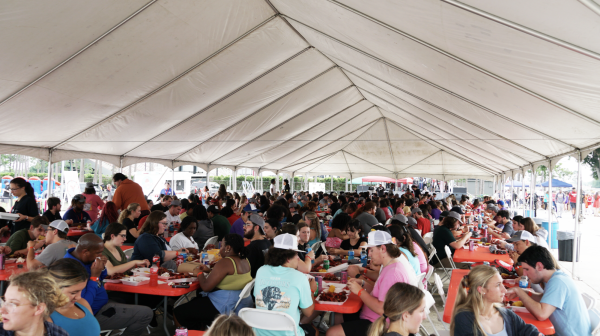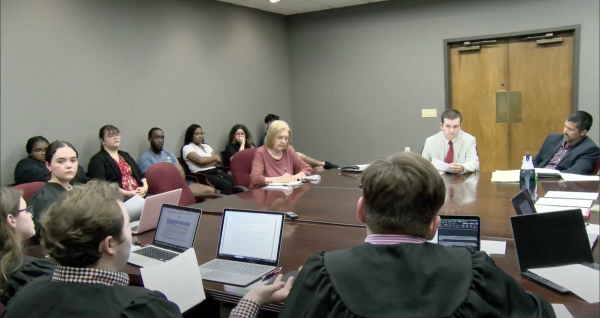Students voicing concerns about WiFi service on campus
Wi-Fi concerns that have plagued students and hindered educational technology may be caused by out-of-date equipment and confusion over the availability of sufficient funding.
“I know Wi-Fi is a big thing. If it goes out, you can’t do schoolwork, you can’t socialize, you can’t do pretty much anything,” Adam Lefort, Student Government Association President, said.
Slade Besson director, of Telecom & Networking, has been aware of the problem for some time and has been actively seeking funding to facilitate upgrades.
Besson said, “I have been requesting to upgrade that network switch in each of the building, but the budget has never been approved. As soon as the budget is approved and we can replace those network switches, it will help out. We still would be pegging our Internet connection, but it should ease it up a little more than what it is.”
Besson continued, “I have been requesting it for a couple of years. We were able to get the main router, which was probably the most expensive piece, through other funding. Now we are just waiting for housing to approve the network switches portion of it, which is a little less expensive, but it is various buildings. We are looking at $7,000 or $8,000 per building to replace the network switches.”
In 2008 the construction budget used to build Millet, Scholars and Zeringue provided funds to purchase new network gear. That same year, the dorms were put on a wireless Internet network, which averaged 100 devices connected to the network at any time. Currently, the same network averages 4,500 connected devices while seeing minimal updates since 2008.
“The network gear itself in all of the buildings just hasn’t had any investments. We were able to replace some network equipment on the academic side through maintenance. It was actually cheaper to buy new equipment than it was to continue to pay maintenance on our old equipment, so I was able to use some of the maintenance money to swap it out and save the university money for future years. That is really the only investment we made in our network since 2008,” Besson said.
“We need money, basically,” Jared Domangue, Network Manager, said.
Besson added, “Money would help tremendously. At this point, we are doing the best we can with the resources we have.”
Eugene Dial Jr., Vice President of Student Affairs, does not believe funding has ever been a problem, saying, “Everything that I have known that Slade Besson has said that we have needed for the residence halls, we have approved funding to do.”
Dial described exchanges he has had with Besson regarding the matter. He said, “I specifically asked him, ‘Tell us what we need. Are there any complaints?’ and his response was, ‘No there’s no complaints. We think we have it under control.’ If there is something that needs to be done, I am going to ask him.”
Besson says, “The overall investment in the network just stopped. Since we have been getting budget cuts, the operating side of the house has not been investing anything as far as network goes.”
Besson also made it clear that he has requested funding multiple times, and has never heard anything back from administration.
Brenda Haskins, executive director of Auxiliary Services, was not aware that students were encountering problems with the Wi-Fi on campus.
“I have not been getting a lot of complaints about Wi-Fi in the residence halls. The only building that I have gotten complaints about is Calecas, and it is usually the rooms that are just in a certain section of the building,” Haskins said.
Calecas was described by Besson as “the worst complex” as far as getting a reliable wireless connection. The layout of Calecas means that any updates would have to include rewiring, along with adding or moving access points.
“We submitted a budget to upgrade that facility because that is by far the worst. The requisition was put in. The budget was not there, so we got turned down by the CFO,” Besson said.
However, Besson said his department has received numerous complaints from students that cannot be addressed without increasing funding.
“We do get complaints every semester, and that is documented. Apparently, it hasn’t been enough for them to really look at it, although I do stress it quite often,” said Besson
Sambida Perdhan, a senior Biology major from Nepal and a resident of Calecas, described the quality of the Internet in her dorm, “The connection is very poor. Even if we connect to Internet, it says very limited access. Also, I have to keep restarting my laptop after trying to connect a number of times to see if I get access. The worst part is when I am doing an online assignments or quizzes and the Internet decides to stop working.”
Perdhan added, “A couple of other residents have talked about this with one of the RAs. I am not sure about SGA, but I heard they talked about it. I did talk about it with one SGA member. It’s not much of a difference, so I am not sure where the issue was addressed. Sometimes the Internet is good, but it’s very rare to have good connection.”
Haskins added, “At this point the Wi-Fi has not been presented as a major problem for me or the administration for our students.”
Cresside Caldwell, a Geomatics sophomore from Marrero, Louisiana, has also heard student complaints about the Wi-Fi.
“A lot of people talk about the Wi-Fi. I talk about the Wi-Fi. Even on a social media site called Yik Yak, everyone talks about how bad the Wi-Fi is.”
Caldwell lives in Scholars Hall, where she has struggles because her dorm does not receive a good Internet connection. Caldwell’s roommate contacted housing, maintenance and the IT department around five times until they were finally paid a visit in October.
“I talked to the IT people, and they said there isn’t a router close enough to our room. They were going to try to move a router from down the hall, but they haven’t comeback to check on it,” Caldwell said.
This problem has also impacted Caldwell academically. After spending months struggling with the Internet connection, Caldwell was forced to bring a hotspot from home that her parents pay for separately.
“If the Internet gets really bad and in trying to take a quiz or doing homework that’s due, I turn the hotspot on and the Internet works way faster,” Caldwell said.
“They are supposed to provide us with Internet. If you go on the Nicholls website, it says that Internet will be provided on campus, but it’s not good Wi-Fi,” said Caldwell.
Misa Gosserand, a Broadcast Journalism senior from Baton Rouge, Louisiana experienced problems a few weeks ago when the Wi-Fi was out of service for about four hours.
“I actually had a test do. I also had a paper to write. I got back to my room after work, and there was no Internet on my phone, my laptop, my iPod, nothing. I thought it was just me, but apparently it was all over campus. I was just really aggravated. I tried to find answers, but no one could give me answers,” Gosserand said.
Andre Smith, a Broadcast Journalism senior from Baton Rouge, Louisiana, has also had negative experiences with the on campus Wi-Fi.
“One of the bad experiences I had was recently when the game Destiny came out, and I wanted to play it so badly. I tried to play it, and it said, ‘Your internet connection has failed.’ It was just not good enough, so it would support the game play. I spent $60 dollars on this game that was brand new and I couldn’t play it. I have to wait until I go home to play it,” Smith said.
Smith also said, “In my major, we need the Internet to do most of our assignments. If we can’t get that funding or the people upstairs can’t get that funding to update the Internet, then we are pretty much screwed and our work is going to suffer.”
Smith was not surprised by the lack of updates the network has seen. He said, “Once again, we are at Nicholls where people wait until something is drastic until they start doing something. We need to get on board with the updates for the Internet.”
Kendall Keiser, an Education freshman from Kenner, Louisiana, described her experience with the WI-FI. She said, “It goes in and out when you are on your computer. I remember one time I was trying to do math homework that was due that night, and I couldn’t finish it because the Internet was going out.”
On Tuesday, administration requested updated figures from Besson in order to finally address the problem.
“Whatever the problem is, we need to clearly identify it and then come up with a plan. If we can’t afford to do it all, we have to see what are the most important things to do,” Dial said.










